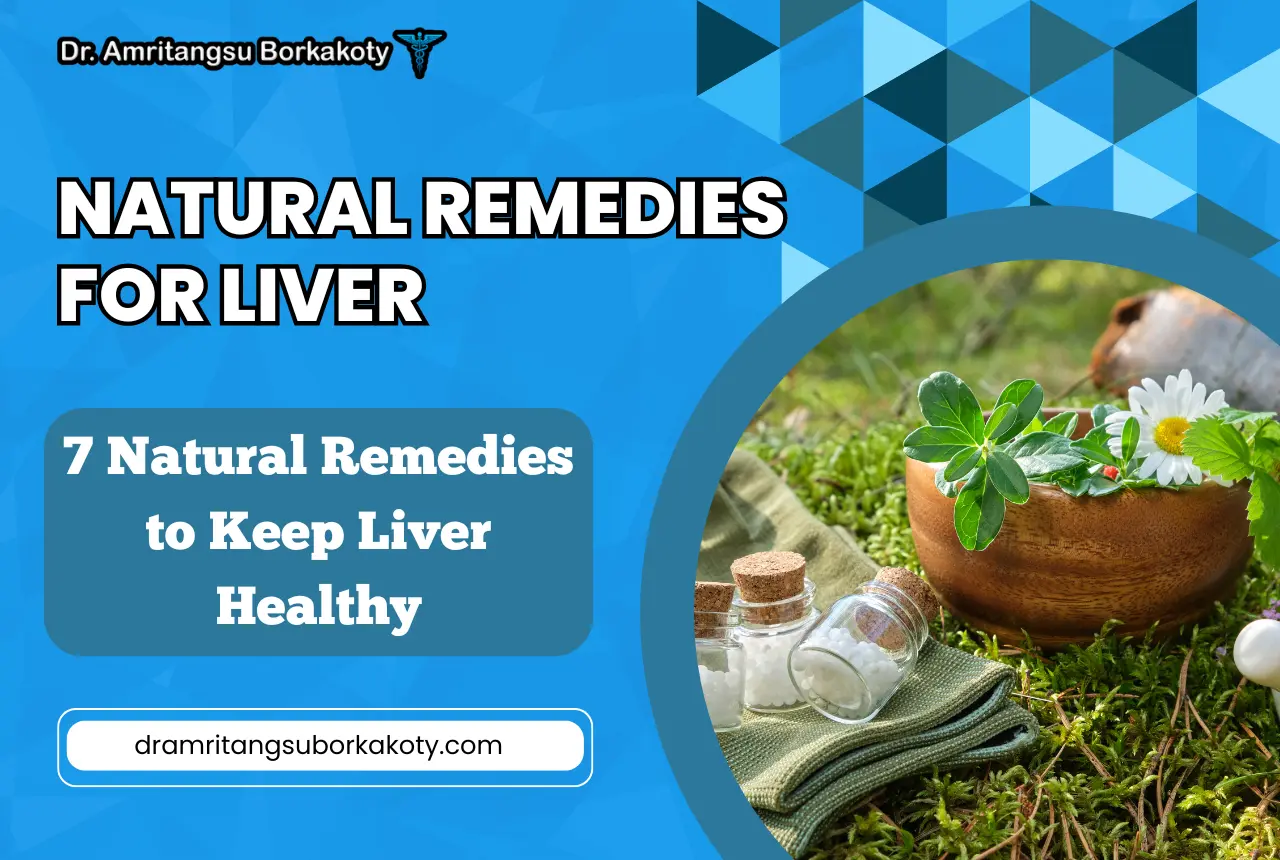
-
 Posted By Dr. Amritangsu Borkakoty
Posted By Dr. Amritangsu Borkakoty -
-
Comments 0
There are natural remedies for liver as it is a vital organ that plays a crucial role in numerous bodily functions, including detoxification, metabolism, and nutrient storage. It filters harmful substances from the blood, processes nutrients, and produces bile to aid in digestion. Unfortunately, due to factors such as unhealthy lifestyle, medication, and underlying medical conditions, liver problems have become increasingly prevalent.
Many people are seeking natural alternatives to traditional medical treatments to address liver health concerns. Natural remedies, derived from plants, herbs, and dietary changes, offer a holistic approach to supporting liver function and promoting overall well-being. These remedies often focus on detoxifying the liver, reducing inflammation, and improving its ability to process toxins.
In this blog post, we will explore seven effective natural remedies that can help you keep your liver healthy. These remedies include dietary changes, herbal supplements, and lifestyle modifications that can contribute to optimal liver function. By incorporating these natural approaches into your routine, you can support your liver’s health and potentially reduce the risk of liver diseases.
Natural Remedies for Liver: 7 Remedies to Keep Your Liver Healthy
1. Dietary Modifications for Liver Support
A healthy diet is fundamental for maintaining liver health. By providing essential nutrients and minimizing harmful substances, you can support your liver’s ability to function optimally.

Beneficial Food Groups for Liver Health:
- Cruciferous vegetables: These vegetables, such as broccoli and cauliflower, are rich in antioxidants and detoxification enzymes that can help protect the liver from damage and promote its ability to eliminate toxins.
- Green leafy vegetables: Spinach, kale, and other green leafy vegetables are packed with chlorophyll, a pigment that binds to toxins and helps remove them from the body.
- Fruits rich in antioxidants: Berries and citrus fruits, like blueberries, strawberries, and oranges, contain antioxidants that can protect liver cells from oxidative damage and reduce inflammation.
- Healthy fats: Olive oil and avocado provide healthy fats that can support liver function and reduce inflammation.
- Lean protein sources: Fish, chicken, and other lean protein sources provide essential amino acids that are necessary for liver repair and regeneration.
Foods to Limit for Liver Health:
- Saturated and trans fats: Excessive intake of saturated and trans fats, found in fried foods and processed meats, can contribute to fatty liver disease.
- Added sugars and refined carbohydrates: Consuming too many added sugars and refined carbohydrates, such as sodas and pastries, can overload the liver and contribute to metabolic issues.
- Excessive alcohol consumption: Alcohol is a major cause of liver damage and can lead to conditions like fatty liver disease, cirrhosis, and hepatitis.
2. Milk Thistle: A Traditional Remedy for Liver Health
Milk thistle (Silybum marianum) is a popular natural treatment for liver health. It’s been used for millennia to help the liver operate and prevent it from harm. Milk thistle’s active component is silymarin, a flavonoid compound that has been intensively researched for its possible health benefits.
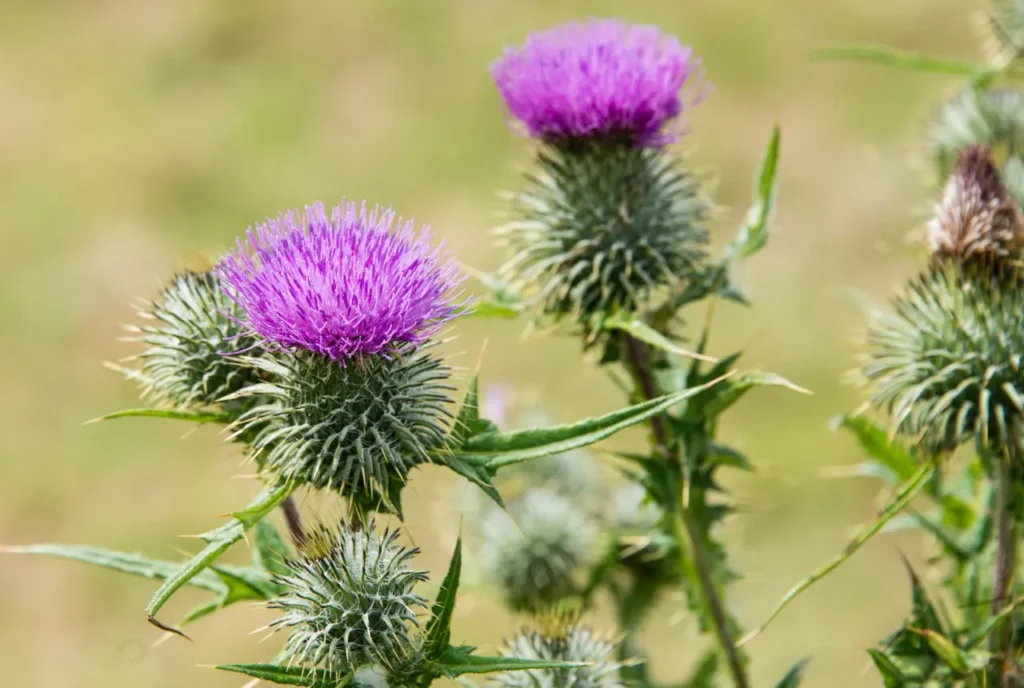
Silymarin is believed to work by:
- Supporting liver cell regeneration: It may help stimulate the growth of new liver cells, aiding in the repair and regeneration of liver tissue.
- Reducing inflammation: Silymarin has anti-inflammatory properties that can help reduce inflammation in the liver, which is often associated with liver diseases.
- Promoting detoxification processes: By supporting liver function, milk thistle may help enhance the liver’s ability to detoxify the body and remove harmful substances.
The recommended dosage of milk thistle can vary depending on individual needs and the specific condition being treated. It is important to consult with a healthcare professional to determine the appropriate dosage for you.
3. The Power of Antioxidants: Green Tea and Coffee
Antioxidants play a crucial role in protecting liver cells from oxidative stress, which can contribute to liver damage and disease. Green tea and coffee are both rich in antioxidants that can help support liver health.
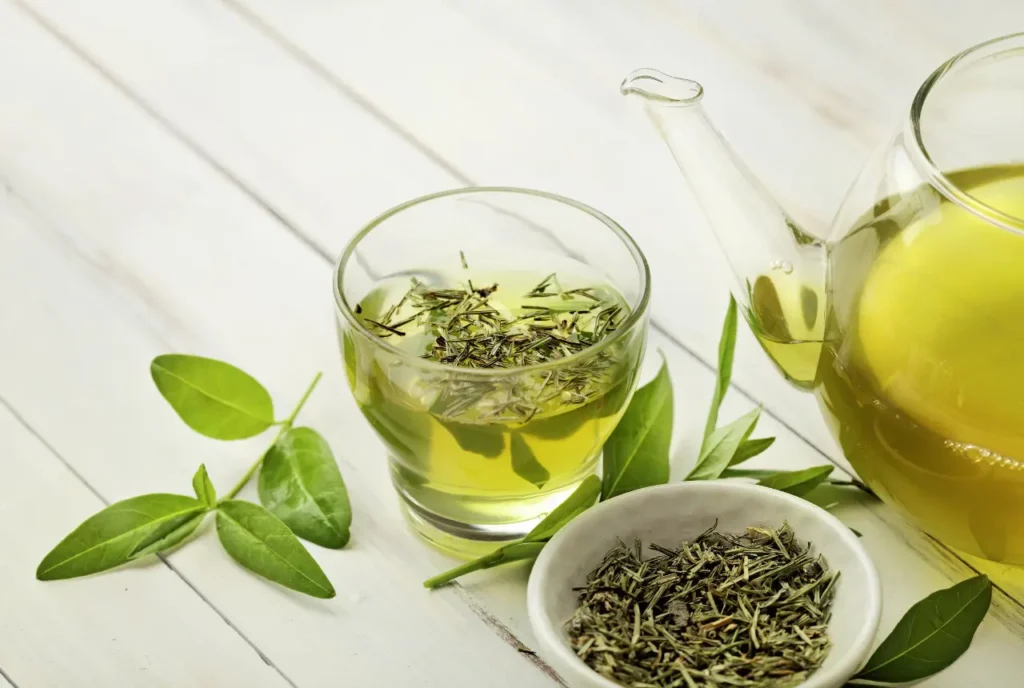
Green Tea:
- Rich in antioxidants: Green tea is packed with antioxidants, especially catechins, which have been shown to have various health benefits.
- May help reduce fat accumulation in the liver: Some studies suggest that green tea may help reduce the accumulation of fat in the liver, which is a risk factor for fatty liver disease.
Coffee:
- May lower the risk of liver diseases: Several studies have found that moderate coffee consumption may be associated with a lower risk of liver diseases, including cirrhosis.
- Antioxidants help protect liver cells: Coffee contains antioxidants that can help protect liver cells from damage.
While green tea and coffee can offer potential benefits for liver health, it is important to consume them in moderation. Excessive caffeine intake can have negative effects on some individuals, so it is advisable to consult with a healthcare professional if you have any concerns.
4. Embrace the Spice: Turmeric for Liver Support
Turmeric, a vibrant yellow spice commonly used in Indian cuisine, has been gaining attention for its potential health benefits, including its potential to support liver health. The active compound in turmeric is curcumin, which has been extensively studied for its anti-inflammatory and antioxidant properties.
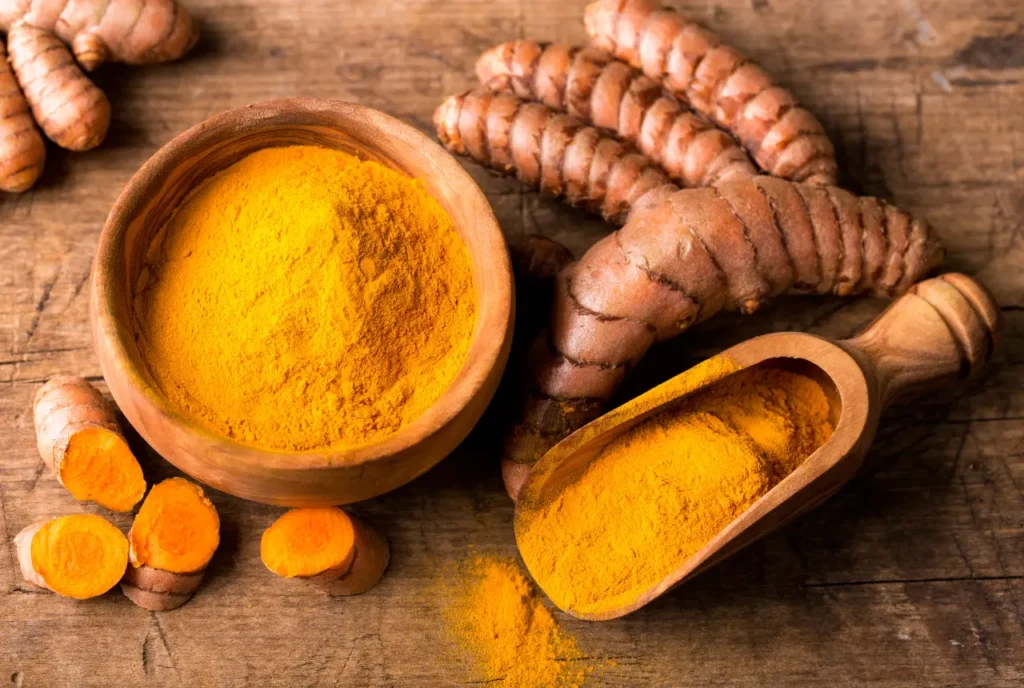
Curcumin may offer several benefits for liver health, including:
- Anti-inflammatory properties: Curcumin’s anti-inflammatory properties can help reduce inflammation in the liver, which is often associated with liver diseases.
- May improve detoxification processes: Curcumin may help support the liver’s detoxification processes by enhancing its ability to eliminate harmful substances.
- May help protect against liver damage: Curcumin’s antioxidant properties can help protect liver cells from damage caused by free radicals.
To increase the absorption of curcumin, it is recommended to combine it with black pepper. Piperine, a compound found in black pepper, can enhance the bioavailability of curcumin. Additionally, consuming turmeric with healthy fats, such as olive oil, can also improve its absorption.
5. Unveiling the Power of Herbs: Ginger and Garlic
Ginger and garlic are two common herbs that have been used for centuries for their medicinal properties. Both of these herbs have shown potential benefits for liver health.
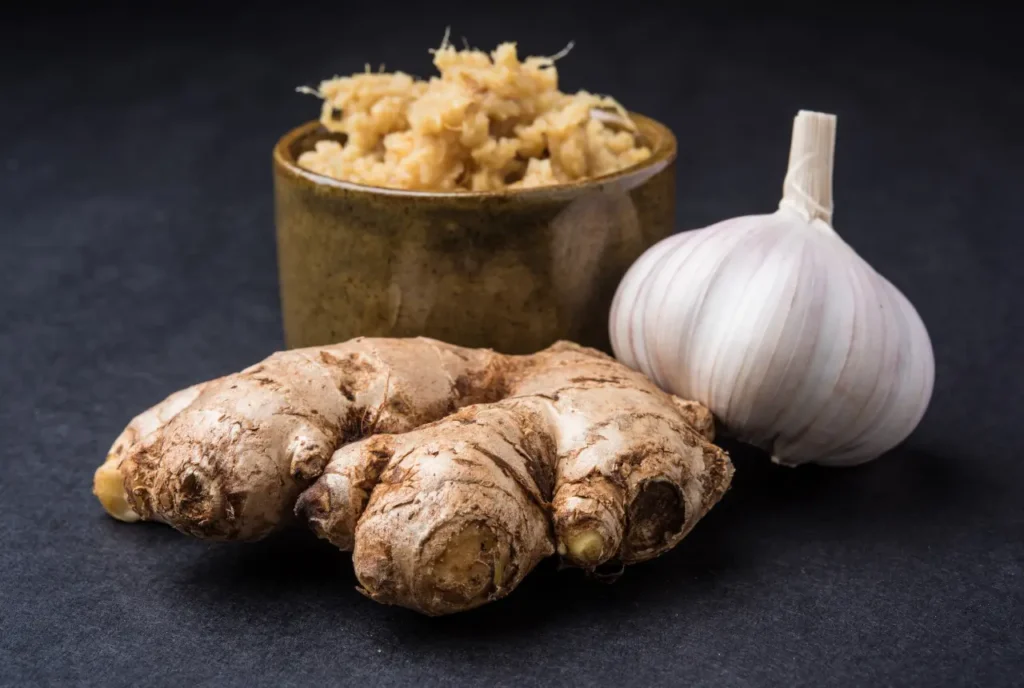
Ginger:
- Anti-inflammatory properties: Ginger is known for its anti-inflammatory properties, which can help reduce inflammation in the liver.
- May improve detoxification processes: Ginger may help support the liver’s detoxification processes by enhancing its ability to eliminate harmful substances.
- May help reduce fat accumulation in the liver: Some studies suggest that ginger may help reduce the accumulation of fat in the liver, which is a risk factor for fatty liver disease.
Garlic:
- May help reduce inflammation: Garlic has been shown to have anti-inflammatory properties that can help reduce inflammation in the liver.
- May help protect against liver damage: Garlic may help protect the liver from damage caused by oxidative stress.
While ginger and garlic have shown promise for liver health, more research is needed to fully understand their benefits. It is always advisable to consult with a healthcare professional before incorporating new herbs into your diet.
6. Embrace a Healthy Lifestyle for Liver Health

In addition to dietary adjustments and herbal therapies, maintaining a healthy lifestyle is essential for liver health. Your general lifestyle habits, such as exercise, weight control, sleep, and stress management, can have a substantial impact on your liver’s health.
Key Lifestyle Habits for Liver Health:
- Regular exercise: Engaging in regular physical activity can help promote detoxification, improve overall health, and reduce the risk of liver diseases. Aim for at least 30 minutes of moderate-intensity exercise most days of the week.
- Maintaining a healthy weight: Being overweight or obese can increase the risk of fatty liver disease. By maintaining a healthy weight through a balanced diet and regular exercise, you can reduce the burden on your liver.
- Adequate sleep: Sleep is essential for the body’s regeneration and repair processes, including liver function. Aim for 7-9 hours of quality sleep each night.
- Stress management: Chronic stress can negatively impact liver function. Incorporate stress management techniques into your routine, such as meditation, yoga, or deep breathing exercises, to help reduce stress levels.
7. Importance of Hydration: Water is Your Liver’s Best Friend
Hydration is necessary for general health and aids liver function. Adequate water consumption aids in the removal of toxins from the body, hence reducing the stress on the liver. Water is also required for a variety of liver functions, including bile production and enzyme regulation. Staying hydrated can help your liver operate properly and lower the risk of liver issues.
Rewinding
The liver is an important organ that influences our overall health. By promoting its function, we can improve our health and lower our risk of developing liver illnesses. Natural therapies, such as dietary adjustments, herbal supplements, and lifestyle changes, can be useful in improving liver health.
By adopting the suggestions in this blog post into your daily routine, you can help your liver perform more efficiently. Remember to see a healthcare expert for personalised advice and to address any underlying health issues. Prioritising liver health allows you to live a healthier and more vibrant life.
Recent Posts
- Common Causes of Stomach Ulcers and Effective Treatment Options
- Early Symptoms of Liver Damage: How to Spot the First Warning Signs Before It’s Too Late
- Best Treatment for Hepatitis B and C: Your Complete Guide to Symptoms, Care, and Prevention
- How to Reduce Liver Inflammation Fast: 5 Proven Tips for Rapid Liver Recovery
- Why You Shouldn’t Ignore NAFLD: 5 Shocking Health Risks You Need to Know



